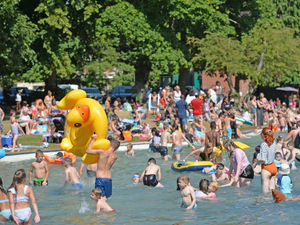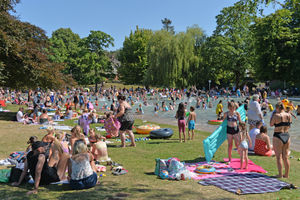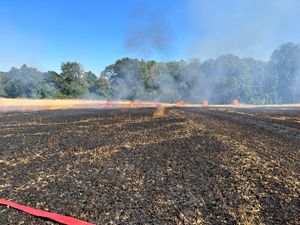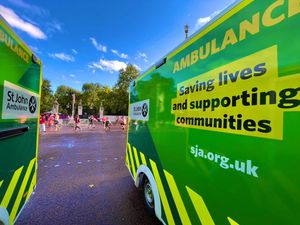Bumper crowds enjoy Tettenhall Pool but people warned to take care
Temperatures are set to climb into the 30s today across the Black Country as the second heatwave of the year rolls in.

An amber weather warning of extreme heat has been issued by the Met Office from today until Sunday.
Experts warned today that there is an "exceptional" risk of wildfires as an amber heat warming comes into place.
The Met Office has raised the Fire Severity Index to very high for the West Midlands.
And in areas of southern England it has been raised to the highest level, 'exceptional'.
The weather is not expected to be as extreme as it was in July which saw records smashed when the thermometer climbed above 40C in some areas of the UK for the first time.
People in Wolverhampton have wasted no time in making the most of the sun, with hundreds flocking to the ever-popular Tettenhall Pool.

Local John Green said it "must be the biggest crowd I have ever seen up here in over 50 years" with others describing their day out as "a blast".
The soaring temperatures, though, have resulted in many safety warnings being issued locally concerning water safety, fire hazards and general advice for making do in the heat.
Staffordshire Fire and Rescue Service have moved to warn people to take care around open water, to not have a garden bonfire and to ensure cigarettes are discarded safely.
People have also been reminded that barbecues and portable cookers are not allowed in their parks and open spaces.
The warning follows a small fire at Dartmouth Park in West Bromwich which took place on August 4
Met Office meteorologist Marco Petagna said the risk of wildfires was very real and urged people to remain cautious and vigilant.
He said: "The risk is very high across much of central, southern and eastern England.
"Going into Friday and the weekend, it starts to increase further, going into the highest category of exceptional risk."
The warning comes a day after firefighters in the West Midlands spoke of dreading the heatwave after complaining “resources have been cut to the bone”.
A number of fires have already sent large plumes of black smoke into the air in the region.
Crews from Market Drayton, Whitchurch, Shrewsbury, Prees and Wem scrambled to tackle a combine harvester fire near Wem.

Elsewhere, crews from Hereford & Worcester Fire and Rescue used off-road vehicles to assist a farmer to extinguish a combine harvester fire as well as a blaze on open land that had affected a 40,000 square metre area of standing crops in Tenbury Wells.
The Fire Brigade Union has warned the next few days could be deadly as temperatures soar with more wildfires feared.
Speaking to the Star yesterday, FBU representative for the region Kevin Bough said: “It could be really dangerous. Wildfires in fields are lot more dangerous for firefighters because there is a lot less water around than in the city."
He claimed numbers of firefighters had been reduced substantially in the last decade and were in danger of being "overstretched", a claim disputed by West Midlands Fire Service.
Riccardo La Torre, national officer for the Fire Brigades Union, has warned that services across the UK are "completely unprepared" for the level of risk posed by the imminent heatwave.
Mr La Torre said: "These are brutal, brutal fires to fight. The temperature that they burn at, the speed at which they spread at.
"The reality is we've been left completely unprepared to do that as a fire and rescue service.
"We've had over a fifth of the workforce cut since 2010, that's over 11,500 firefighters cut. Yet we're asking them to deal with these extreme weather events in increasing regularity and increasing severity.
"The professionals on the ground have been warning that these conditions are coming and we very much saw the reality of that in these last few weeks.
"Firefighters have been injured, firefighters have ended up in hospital, we've seen families lose their homes, we've seen businesses lost, infrastructure burn to the ground, because we simply can't get to these fires quick enough.
"When we do, we simply don't have the resources to deal with them adequately."
Mark Hardingham, the chairman of the National Fire Chiefs Council (NFCC) said he "can't remember a summer like this" in his entire 32-year career in the fire service.
He said: "We're not going to see temperatures as hot as we saw three weeks ago, but that doesn't matter because the ground couldn't get any drier than it already is."
Mr Hardingham added: "The wildfires are as prevalent in semi-urban areas as they are in rural communities so it's difficult to know where the next one will be."
The Met Office has issued an amber heat warning running between Thursday and Sunday, which could see temperatures peak at 33C (91F) across the West Midlands.
Mr Petagna said that the temperatures would "widely" be in the 30s across the UK, peaking locally in the mid-30s on Saturday.
"I think the hottest day will probably be Saturday, where we could see 36C in one or two spots in the south," he said.
There is also a heat health alert in place from the UK Health Security Agency, with experts advising people to look out for those who are older or with existing health conditions, as well as young children.
It comes as the driest first seven months of the year in decades and hot spells have left parts of the UK facing looming drought, prompting hosepipe bans and warnings about the impact on agriculture, rivers and wildlife.
The latest analysis from the UK Centre for Ecology and Hydrology (UKCEH) has warned that low or even exceptionally low river flows and groundwater levels are likely to continue for the next three months in southern England and Wales.
Mr Petagna said that rain could be on the horizon early next week, with showers likely in the West Midlands on Monday.
"There are signs that we could get some rain next week, but details at the moment are uncertain," he said.
He added that the UK needs "a few weeks" of light rain to water the ground.
"What we really need is a few weeks of light rain to soak into the ground," he said.
"Thunderstorms are more likely to cause some flooding issues because the ground is hard the water can't sink in."





